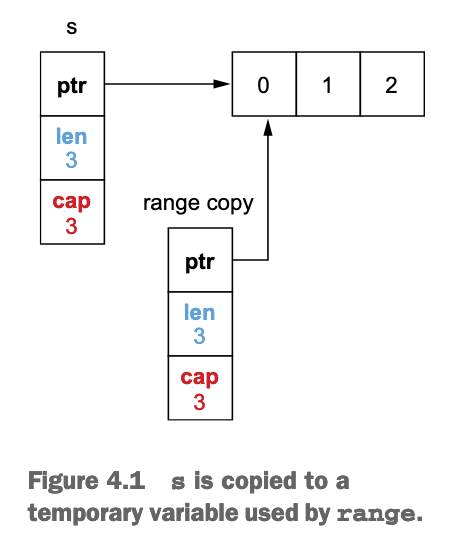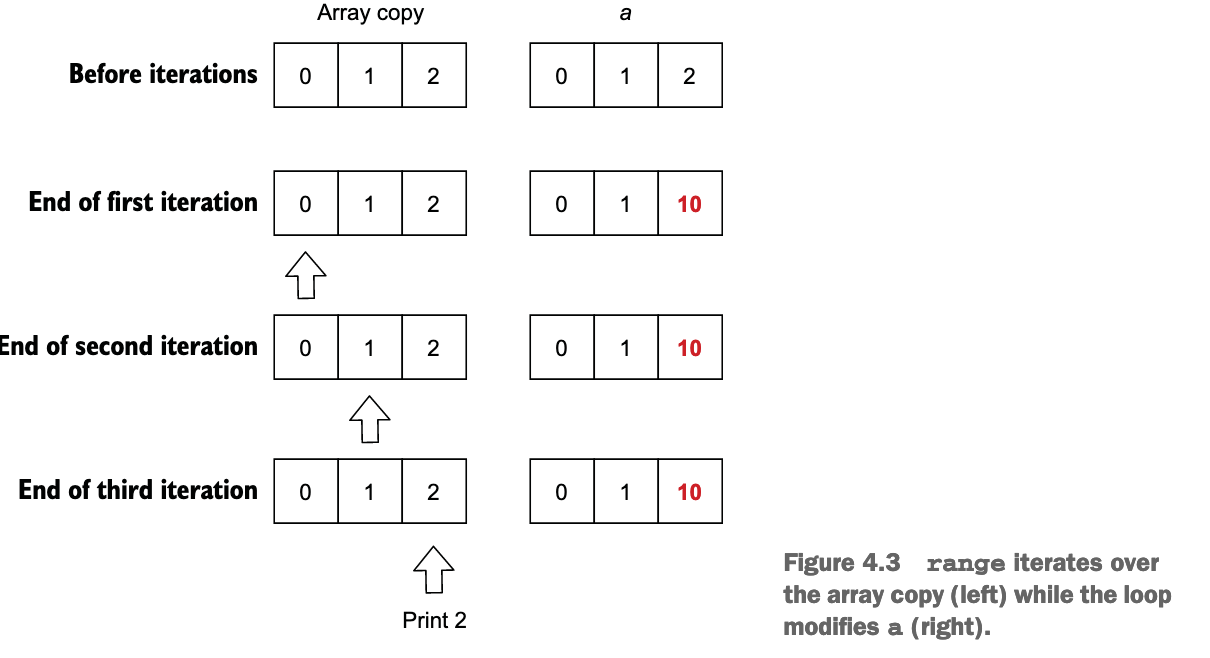30: Ignoring the fact that elements are copied in range loops
type account struct {
balance float32
}
accounts := []account{
{balance: 100.},
{balance: 200.},
{balance: 300.},
}
for _, a := range accounts {
a.balance += 1000
}
// Output: [{100} {200} {300}]
In this example, the range loop does not affect the slice’s content.
In Go, everything we assign is a copy:
- If we assign the result of a function returning a struct, it performs a copy of that struct.
- If we assign the result of a function returning a pointer, it performs a copy of the memory address (an address is 64 bits long on a 64-bit architecture).
Solutions:
for i := range accounts {
accounts[i].balance += 1000
}
for i := 0; i < len(accounts); i++ {
accounts[i].balance += 1000
}
31: Ignoring how arguments are evaluated in range loops
The range loop syntax requires an expression. For example, in for i, v := range exp, exp is the expression.
Will the loop terminate?
s := []int{0, 1, 2}
for range s {
s = append(s, 10)
}
To understand this question, we should know that when using a range loop, the provided expression is evaluated only once, before the beginning of the loop.
In this context, “evaluated” means the provided expression is copied to a temporary variable, and then range iterates over this variable.

The same applies to the array.
a := [3]int{0, 1, 2}
for i, v := range a {
a[2] = 10
if i == 2 {
fmt.Println(v)
}
}

Solution:
Using an array pointer
a := [3]int{0, 1, 2}
for i, v := range &a {
a[2] = 10
if i == 2 {
fmt.Println(v)
}
}
The range loop evaluates the provided expression only once, before the beginning of the loop, by doing a copy (regardless of the type).
32: Ignoring the impact of using pointer elements in range loops
type Customer struct { ID string Balance float64 }
type Store struct { m map[string]*Customer }
func (s *Store) storeCustomers(customers []Customer) {
for _, customer := range customers {
s.m[customer.ID] = &customer
}
}
Iterating over the customers slice using the range loop, regardless of the number of elements, creates a single customer variable with a fixed address.
func (s *Store) storeCustomers(customers []Customer) {
for _, customer := range customers {
fmt.Printf("%p\n", &customer)
s.m[customer.ID] = &customer
}
}
0xc000096020
0xc000096020
0xc000096020

Two solutions:
- Creating a local variable
func (s *Store) storeCustomers(customers []Customer) {
for _, customer := range customers {
current := customer
s.m[current.ID] = ¤t
}
}
34: Ignoring how the break statement works
A break statement terminates the execution of the innermost for, switch, or select statement.
We can use labels to control which block break breaks:
loop:
for i := 0; i < 5; i++ {
fmt.Printf("%d ", i)
switch i {
default:
case 2:
break loop
}
}